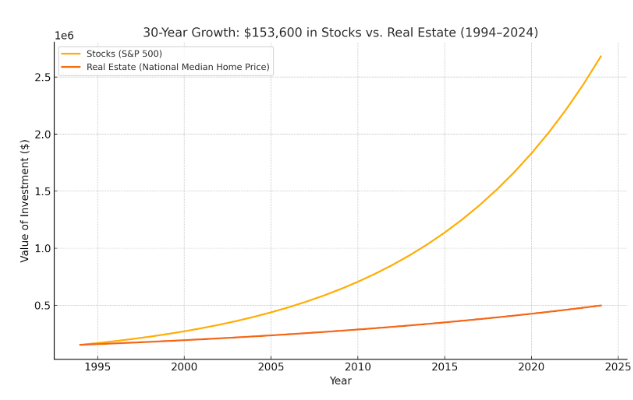Last Updated: June 17, 2025
Real Estate vs. Stocks: Which Is the Better Investment for You?
When it comes to building wealth, two of the most common investment vehicles are real estate and the stock market. Each offers the potential for long-term financial gains—but which one is the right fit for your financial goals, risk tolerance, and lifestyle?
Let’s break down the pros and cons of each to help you decide.
Real Estate Investing: Tangible and Stable
✅ Pros of Real Estate
- Steady Appreciation: Home values have historically risen over time. According to U.S. Census data, the median home price in the U.S. has increased by more than 50% over the last decade.
- Equity Building: Each mortgage payment builds equity, giving you a growing stake in a physical asset.
- Rental Income: Owning property allows you to generate cash flow by renting out your home or a portion of it.
- Tax Benefits: Homeowners may deduct mortgage interest, property taxes, and certain improvements.
- Inflation Hedge: Real estate values and rents typically rise with inflation, helping preserve purchasing power.
❌ Cons of Real Estate
- High Entry Costs: Down payments, closing costs, and maintenance expenses require substantial upfront capital.
- Illiquidity: You can’t sell a portion of a house the way you can sell stocks. Real estate takes time to sell and convert into cash.
- Ongoing Responsibilities: Property owners must handle repairs, tenants, taxes, and insurance.
- Market Dependency: Local economic downturns can affect home values and rental demand.
Stock Market Investing: Flexible and Scalable
✅ Pros of Stocks
- High Liquidity: Stocks can be bought or sold at any time during market hours.
- Low Barrier to Entry: You can start investing with as little as $100 using apps like Robinhood or Fidelity.
- Passive Investing Options: With index funds and ETFs, you can invest broadly across markets without picking individual stocks.
- Long-Term Growth Potential: Historically, the S&P 500 has returned an average of 7–10% annually after inflation.
- Diversification: You can spread your risk across industries, sectors, or countries.
❌ Cons of Stocks
- Volatility: Markets fluctuate daily, and short-term losses can be significant.
- Emotional Investing: It’s easy to panic sell or chase trends without a strategy.
- Less Tangible: Unlike real estate, you can’t live in or physically control your investment.
Real-Life Example: Comparing Returns
Let’s say you invest $300,000:
- In Real Estate: You buy a home, rent part of it for $2,000/month, and your home appreciates 4% annually. After 10 years, the home could be worth $444,000, and you’ve collected $240,000 in rent income.
- In Stocks: You invest in a diversified stock portfolio with 8% annual returns. After 10 years, your investment could grow to about $648,000—with no landlord responsibilities.
Both have potential—just in different ways.
The chart below shows how a $153,600 investment would have grown in stocks versus real estate over the past 30 years (1994–2024). Based on a 10% average annual return, stocks—represented by the S&P 500—significantly outperformed, resulting in much higher long-term gains. This demonstrates the power of compounding in the stock market and why many long-term investors favor equities for growth.
In contrast, real estate—assuming a 4% average annual appreciation in median home values—offered slower but steady growth. While it didn’t match the returns of stocks, real estate provided stability and the added benefit of being a tangible asset. Together, these two asset classes show the value of diversification: stocks for growth potential, and real estate for consistency and long-term security.

Source: Federal Reserve Bank
Which One Is Right for You?
Choose Real Estate if:
- You want a tangible asset you can live in or rent out
- You prefer stable, long-term growth
- You’re comfortable managing property and repairs
- You want to build equity through monthly mortgage payments
Choose Stocks if:
- You want high liquidity and flexibility
- You prefer a hands-off approach with no physical management
- You’re okay with market volatility
- You want to diversify quickly across multiple industries
Why Not Both?
Many savvy investors choose both real estate and stocks to diversify their portfolio. Real estate can provide stability and rental income, while stocks offer liquidity and potential for rapid growth.
Final Thoughts
There’s no one-size-fits-all answer when comparing real estate vs. stocks. Your ideal investment strategy depends on your goals, timeline, risk appetite, and how involved you want to be.
If you’re ready to explore real estate as a path to long-term wealth, Promise Home Loans can help you get started. From securing financing to guiding your home purchase, our experts are here to make homeownership achievable.
Photo Credit:Petmal
Ready to make your move? Start your homeownership journey today.
